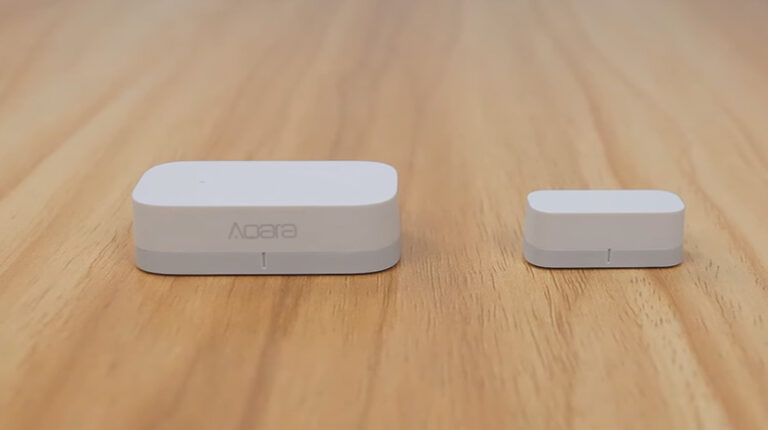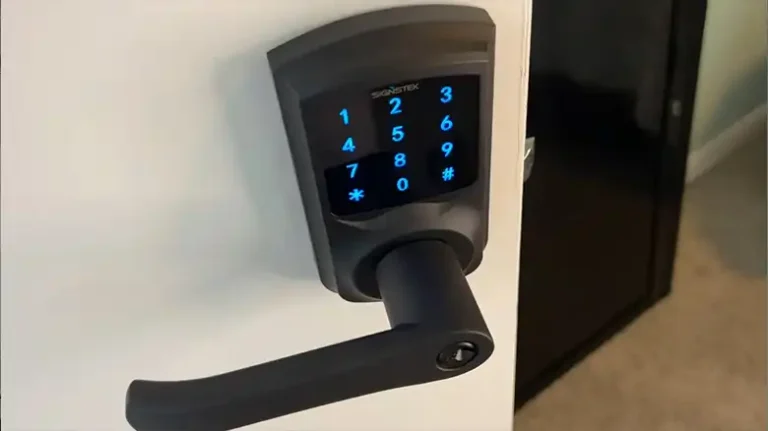Door Latch Stuck In Door Frame – How Do I Fix?
Ever had that frustrating moment when your door latch decides it’s found its forever home in the door frame? You turn the handle, push, pull, and even do a little jig, but that latch is as stubborn as a mule. It’s a common household conundrum that can leave you feeling like you’re starring in your very own escape room challenge.
But don’t worry as you’ve come to the exact place. In this post, we’ll explore the field of door latch stuck in the door frame. We’ll not only unravel the reasons behind this clingy behavior and offer practical solutions but also ensure that you’re armed with the knowledge to liberate that latch and regain your freedom.
So, if you’re tired of feeling like a prisoner in your own home, read on. We’re about to unlock the secrets to conquering the stuck door latch.
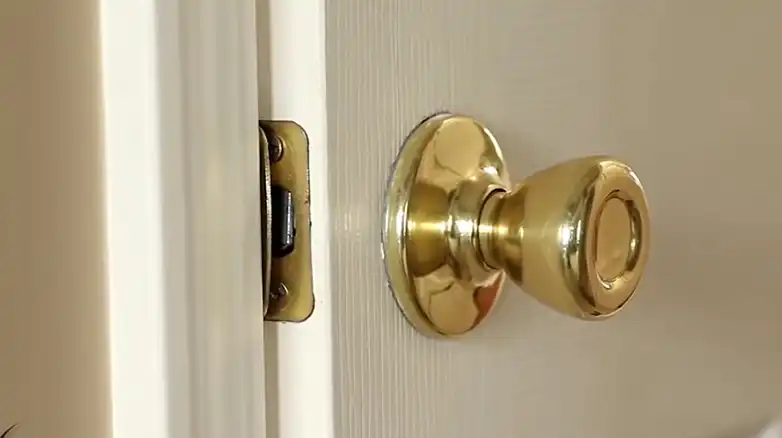
Why Does Your Door Latch Play Hard to Get?
When you find your door latch stuck in the door frame, it’s like dealing with a challenging puzzle. But why does it happen? Understanding the culprits behind this issue can help you navigate it more effectively. Let’s start by understanding why your door latch decides to play hide-and-seek with you –
1. Dirt and Grime Buildup
Over time, dust, dirt, and grime can accumulate in the latch mechanism. This buildup can cause the latch to get stuck, making it difficult to open or close the door smoothly.
2. Misalignment Woes
Sometimes, the door and the door frame can get misaligned due to the settling of the house, temperature changes, or regular wear and tear. When they’re not perfectly aligned, the latch may struggle to find its intended strike plate.
3. Rusted or Corroded Parts
If your door latch components are made of metal, they can rust or corrode, especially in humid or coastal areas. This corrosion can lead to stiffness or complete immobility of the latch.
4. Worn Out Springs
The internal springs within the latch mechanism can wear out over time, losing their ability to retract the latch when you turn the knob.
5. Latch Plate Issues
The strike plate on the door frame might be misaligned, damaged, or loose. This can prevent the latch from engaging properly.
How to Free Your Door Latch from Its Frame?
Now that we know why your door latch can be a bit of a drama queen, it’s time to roll up our sleeves and get to work on setting it free. Here’s a step-by-step guide to help you deal with a stuck door latch –
Step 1: Examine for Obvious Obstructions
Inspect the Latch: Take a close look at the latch itself. Ensure there’s no debris, rust, or visible damage obstructing its movement.
Check the Strike Plate: Examine the strike plate on the door frame. It should be properly aligned with the latch. Tighten any loose screws.
Step 2: Lubricate the Latch
Apply Lubricant: Use a silicone-based lubricant or a graphite lubricant on the latch mechanism. Lubricate both the latch bolt and the internal components. This will help reduce friction and allow for smoother operation.
Work the Handle: After applying the lubricant, repeatedly turn the door handle to distribute the lubricant evenly and work it into the mechanism.
Step 3: Use a Flathead Screwdriver
Insert a flathead screwdriver into the latch opening. Gently push or tap the latch bolt back into the door. Be careful not to damage the latch or the strike plate.
Step 4: Check for Misalignment
If you suspect misalignment, loosen the screws holding the strike plate and reposition it to align with the latch. Tighten the screws securely.
Step 5: Seek Professional Help
If the latch remains stuck despite your efforts, it’s time to call a professional locksmith. They have the expertise and tools to diagnose and resolve complex latch problems.
By following these steps, you can often free your door latch from its clingy embrace and regain smooth access to your home.
Frequently Asked Questions
Can I use any lubricant for the latch, or is a specific type recommended?
It’s best to use a silicone-based lubricant or a graphite lubricant specifically designed for door locks. These lubricants are less likely to attract dust and debris.
How can I prevent my door latch from getting stuck again in the future?
Regular maintenance, including lubrication and occasional tightening of screws, can help prevent latch issues. Additionally, address any misalignment or door frame issues promptly.
Is it possible to fix a rusted latch, or do I need to replace it?
In many cases, a rusted latch can be cleaned and lubricated to restore functionality. However, severe corrosion may require replacement.
What’s the difference between a latch and a deadbolt lock?
A latch is a spring-loaded mechanism that keeps a door closed, while a deadbolt lock is a separate, more secure locking mechanism often used in addition to a latch for increased security.
Can I use cooking oil as a temporary lubricant for the latch?
While cooking oil can provide temporary lubrication, it’s not recommended for long-term use, as it can become sticky and attract dirt. It’s best to use a dedicated lock lubricant.
Is it possible to realign the door and frame myself if they are misaligned?
Minor misalignments can sometimes be corrected by adjusting the strike plate or shimming the hinges. However, for significant misalignment issues, it’s advisable to seek professional help.
End Note
In the battle against a door latch stuck in the door frame, you now possess the knowledge and tools to emerge victorious. Whether it’s a buildup of grime, misalignment, or worn-out parts, you can tackle the issue with confidence. Remember, a smoothly functioning door latch not only provides convenience but also ensures the security of your home. So, go ahead, put these tips into action, and set that latch free!
If you have any more questions or find yourself in a sticky situation, don’t hesitate to leave a comment below. We’re here to help you unlock the solutions you need. Thanks for reading, and may your doors open wide with ease once again!
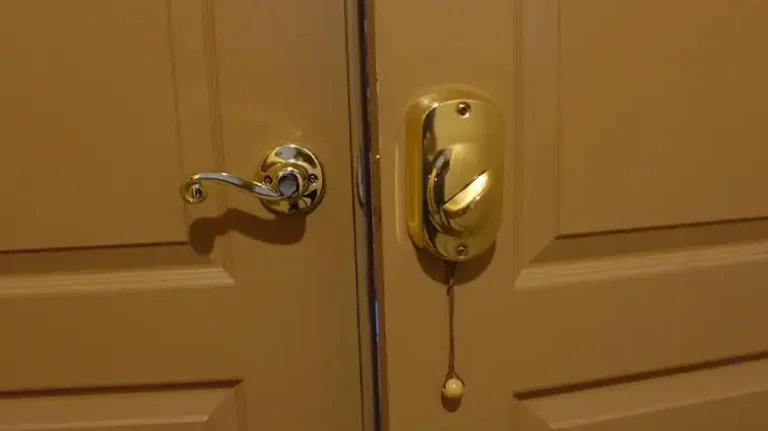
![[Explored] Can You Change a Lock without Changing the Door Knob?](https://doorsuggest.com/wp-content/uploads/2023/09/Can-You-Change-a-Lock-without-Changing-the-Door-Knob-768x431.webp)
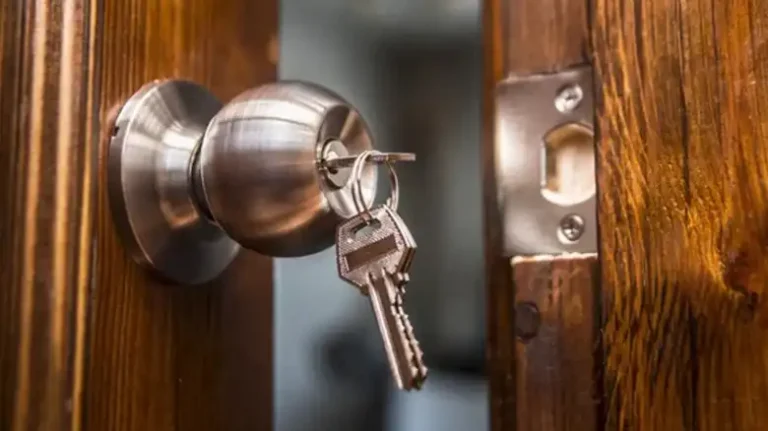
![[Answered] Do New Door Knobs Come with Keys](https://doorsuggest.com/wp-content/uploads/2023/09/Do-New-Door-Knobs-Come-with-Keys-768x431.webp)
